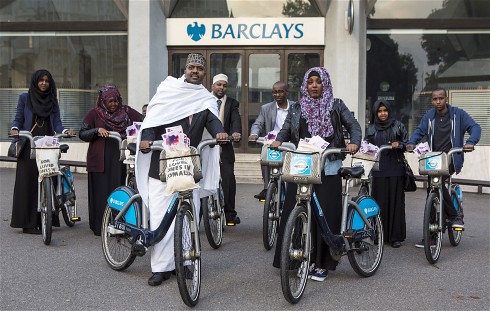
Somalians in London protesting at Barclays bank. They want to maintain remittances sent to the Horn of Africa state through the financial institution., a photo by Pan-African News Wire File Photos on Flickr.
Somalia: Threat to Remittances Lifeline
5 FEBRUARY 2014
Africa Focus
ANALYSIS
"Collateral damage" from the war on terror takes many forms. Civilian deaths from drone or missile strikes are the most dramatic when they come to light. Damage from the "financial war on terror" is less visible but also deadly.
As illustrated in the case of Somalia, regulations intended to curb financing for terrorism end up threatening sources of income vital for survival, such as remittances and humanitarian aid. The effects, although indirect and rarely noted in the media, are systemic and large-scale.
In Somalia, many of the quarter of a million people who died during the 2010-2012 famine could have been saved if U.S. regulations had not blocked humanitarian aid to areas controlled by al-Shabaab (http://tinyurl.com/peq4dk6).
Currently, the remittances lifeline, which is essential for survival to some 41 percent of Somalia's population, is threatened by the potential cutoff of access by Somali money transfer operators to Western banks.
For Somalia, the UK and the US are the two top remittance-sending countries, but most banks refuse to deal with the money transfer operators. One of the largest still handling such transactions has been Barclays Bank, which decided last May to close off these ties because of the alleged risk of financing terrorism.
In November 2013, an injunction blocked Barclays from closing its business with Dahabshiil, the largest money transfer operator (http://tinyurl.com/o7rrl9h). But that injunction expires in October this year.
Prospects for a more permanent solution to facilitate remittances, under study by the British government, are uncertain.
This AfricaFocus Bulletin contains a summary article from the Africa Research Institute in London, which has been following the situation closely, as well as excerpts of an interview with Abdirashid Duale, the chief executive of Dahabshiil.
Notably, Duale says that Barclays raised no concerns about their anti-moneylaundering practices before deciding to cut off business ties.
More generally, the Charity and Security Network (http://www.charityandsecurity.org), based in Washington, DC, has raised ongoing concerns about the negative impact of counterterrorism laws.
Together with a number of other organizations, it is supporting legislation to reduce such collateral damage.
For an overview of the issues see http://www.charityandsecurity.org/blog/2014_Big_Picture
Charity and Security Network, "Somalia: The 2011 Famine and its Response," July 10, 2013. http://www.charityandsecurity.org/ / direct URL: http://tinyurl.com/na3kjkd
"U.S. Counterterrorism Laws Block International Humanitarian Aid," World Policy Journal December 19, 2013 http://www.worldpolicy.org/ / direct URL: http://tinyurl.com/lasvomc
Humanitarian Aid Facilitation Act
https://www.govtrack.us/congress/bills/113/hr3526/text "To permit persons subject to the jurisdiction of the United States to enter into transactions with certain sanctioned foreign persons that are customary, necessary, and incidental to the donation or provision of goods or services to prevent or alleviate the suffering of civilian populations, and for other purposes."
No comments:
Post a Comment